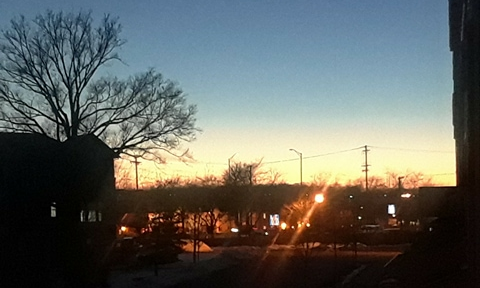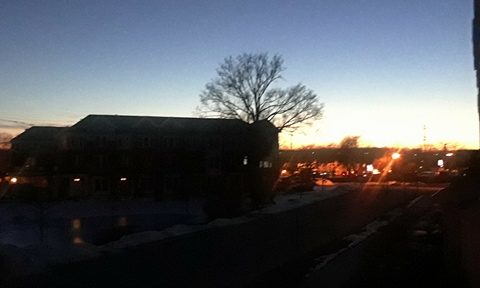Have you ever felt gloomy or depressed when the weather is gray, like just a general inability to be joyful or sudden feelings of anxiety and obsessive worry about anything?
Well, at times I feel a little bit sad the moment I see this kind of view from our patio door where the porch is situated next to it. There are times on the other hand, that I feel at peace and calm when I see the sunset, depending on how vibrant the color of the sky is. It was only awhile ago that I got the chance to capture it, though I could not justify enough its beauty with my phone's camera.

This photo is mine, and I only used my Samsung mobile phone J327A. I did not use any filter.
People who live in the places or states where there's winter season usually feel what's called "winter blues". While these feelings of mild malaise come and go easily for some people like me, each winter signifies a new, unshakable cycle of depression for others that is more serious. It could be a disorder called Seasonal Affective Disorder (SAD) wherein symptoms are far worse when clouds are in the sky.

About 1 to 10% of adults in the US suffer from SAD. First described as a medical condition in 1984, SAD is now listed by the Diagnostic and Statistical Manual of Mental Disorders as a type of major depression. According to WebMD, it is a mood disorder that happens every year at the same time. A rare form of seasonal depression, known as "summer depression," begins in late spring or early summer and ends in fall. In general, though, seasonal affective disorder starts in fall or winter and ends in spring or early summer.
And although SAD is frequently thought of as a winter depression, it can affect patients during other seasons, too. The cause is unknown, but it has been hypothesized that the lack of sunlight disrupts the body's circadian rhythm. According to research published in the journal Nature by Johns Hopkins University neuroscientists, our eyes have special photoreceptors that monitor light levels. These could be linked to the "non-visual" ways we respond to light, such as setting the body’s circadian pacemaker and affecting mood and temperament.
Changes in light levels could explain why the majority of SAD patients experience symptoms during winter and remission during spring. Other symptoms include bouts of craving carbohydrates and tend to be more sleepy with an additional 2 hours of sleep a day during winter than during the rest of the year.
How to cope
While some SAD sufferers may be too lethargic or depressed to leave the house, outdoor activities and regular exercises can help alleviate the symptoms. A 2007 study by Duke University researchers confirmed that exercise is comparable to antidepressant medication in treating patients with major depressive disorders.
And because the illness is linked to the production of serotonin in the brain and the duration of exposure to bright sunlight, according to a 2002 Lancet study, increasing your exposure to daylight can be comforting.
Others are recommended to use a specialized light-box therapy that mimics outdoor light and some people can also benefit greatly from cognitive behavioral therapy (CBT). Some preliminary data have shown that talk therapy could work better than light therapy in the long run. The results can vary among patients, however.
Antidepressants, therapy, exercise and light-box treatments may help alleviate seasonal affective disorder. I suggest you to seek a professional help when you feel the need of the said therapy or treatment.

There are a lot more ways on how to uplift your mood or spirit, so be intuitive with your needs before your feelings could even get worse. You can talk stuff over with your friends or loved ones, or bond with them; play your favorite songs; read a good book that interests you; and most importantly, I believe, growing your relationship with God would be of great help in freeing yourself from anything that affects your mood, as you know Him well.
I hope you've learned some thing from this post and if you want to add more information regarding this topic, feel free to say anything below.
Until next time. :)
Reference: http://www.nbcnews.com/id/41292953/ns/health-mental_health/t/feeling-sad-how-cope-when-sun-goes-away/#.WoeRmejwbIU
https://www.webmd.com/mental-health/tc/seasonal-affective-disorder-sad-topic-overview#1

Hi! I am a robot. I just upvoted you! I found similar content that readers might be interested in:
https://www.livescience.com/11665-cope-seasonal-affective-disorder.html